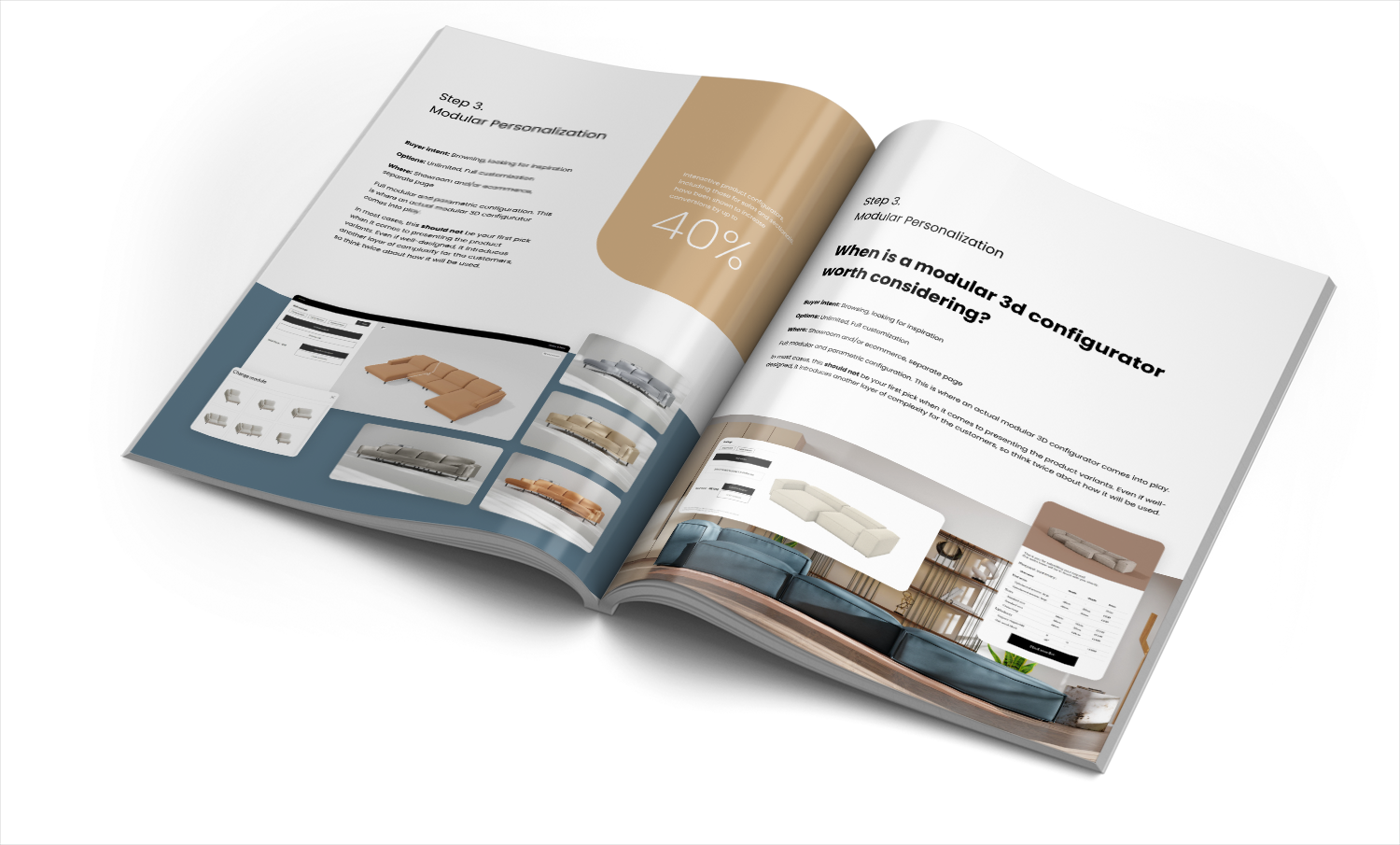The Ultimate 2025 Sofa Configuration Guide
Get your free copy todayy!

Content markdown: Quoting mistakes are a silent profit killer in furniture sales. When teams send customers away with cryptic lists of product codes, unclear pricing, and little context, errors multiply—misquoted prices, wrong dimensions, mismatched modules, or production orders that don’t fit the customer’s actual request. These mistakes cost time, break trust, saddle production teams with corrections, and burn opportunities. Fortunately, 3D and visual configurators have rewritten the quoting process for brands that demand accuracy and consistency.
Relying on manual quoting tools or basic PDFs, many showrooms and dealers force staff to cross-check codes, prices, and options by hand. This leads to frequent errors—incorrect module combinations, missing options, inconsistent pricing. Not only do these mistakes frustrate customers, but fixing them wastes internal resources and delays closing deals.
Enter the modern 3D product configurator. Unlike static lists, a configurator is rules-driven: it prevents configuration errors through smart logic, only allowing valid combinations. Real-time visuals and pricing leave no room for guesswork. For example, one leading furniture brand previously required a dedicated staff member to manually validate every modular sofa order—a tedious job plagued by overlooked details. By integrating a configurator, the system now automatically checks all compatibility, generates accurate production data, and creates precise PDF quotes—including 3D visuals, dimensions, and even AR previews (see how augmented reality supports sales).
| Aspect | Traditional Quoting | Configurator-Based Quoting |
|---|---|---|
| Error Rate | High (manual checks) | Drastically reduced (system logic) |
| Visuals Provided | None or static images | 3D, realistic, with lighting |
| Quote Consistency | Varies by staff | Always consistent and up-to-date |
| Time to Generate Quote | Slow | Minutes, even live during meetings |
| Integration to Production/CRM | Manual re-entry | Automatic data flow |
Eliminating ambiguity and errors is a key benefit of automated quoting, as explored in what is a quote pack and how to generate one instantly. Automating the creation of detailed quote bundles enhances customer confidence and speeds up the sales process.
Lack of context in quotes—no visuals, incomplete info, unclear lead times—breeds hesitation and slows decisions. When customers don’t understand their quote, or see generic product sketches, they lose confidence and bounce. A configurator changes this dynamic. Every customer receives a tailored PDF: photo-quality 3D rendering, accurate dimensions, live price, and an AR link to view the piece in their space (refer to how AR impacts returns in furniture e-commerce).
Sales teams leverage this instant clarity in showrooms too. Instead of explaining options, they guide customers through an interactive session, building and pricing real products together. Contracts can be generated on the spot; quote errors virtually disappear. For one client, this shift cut their average quote-to-order time in half and doubled their close rates on complex, customizable furniture, consistent with improvements discussed in how does a configurator shorten the sales cycle.
Quoting errors don’t just frustrate customers; they cripple operations downstream. Manual quotes often require back-and-forth between sales and production to resolve mistakes before manufacturing can begin. This delays production, increases labor costs, and eats at margins.
By connecting the configurator to ERP, CRM, and PIM systems, all validated product choices, BOM data, and customer info flow automatically across the business, reducing manual data entry errors as explained in integrating a 3D product configurator with ERP. Production teams receive clean, validated order data. Sales reps see quote status and follow-up triggers in CRM. Marketing can even use the same data set for remarketing or customer education flows, reflecting practices from how to turn configurator sessions into personalized follow-ups. Brands who adopted this flow saw error-related delays nearly eliminated, and ROI on automation within a single product cycle.
Moreover, automating Bill of Materials (BOM) generation directly from the configurator ensures accuracy and reduces costly errors, as highlighted in what's a BOM and why does my configurator need to produce it.
Basic quoting leaves customers with more questions than answers: “Will this fit? Why does it cost this much? Is it available?” Unanswered, these questions kill conversions. Using a configurator, customers build their product, see costs update in real time, order matching fabric samples, and leave with a precise, custom quote. They’re qualified—and confident—before ever speaking with a rep, grounded in concepts from can a configurator help me qualify leads better.
This approach also weeds out dead leads. Customers who self-qualify on configuration and pricing are more likely to convert, increasing close rates while lowering unnecessary workload for the sales team, a benefit demonstrated in how to prequalify leads by instantly providing a ballpark estimate online.
Ready to see how a best-in-class configurator can streamline your quoting and eliminate costly errors? Book a free, 30-minute consultation with our automation experts. Let’s troubleshoot your quoting process and build a smoother path from first click to signed contract.
For more insights on implementing and scaling configurators in furniture sales, check our detailed strategic guides like implementation roadmap for 3D configurators and how does a configurator scale sales without scaling headcount.